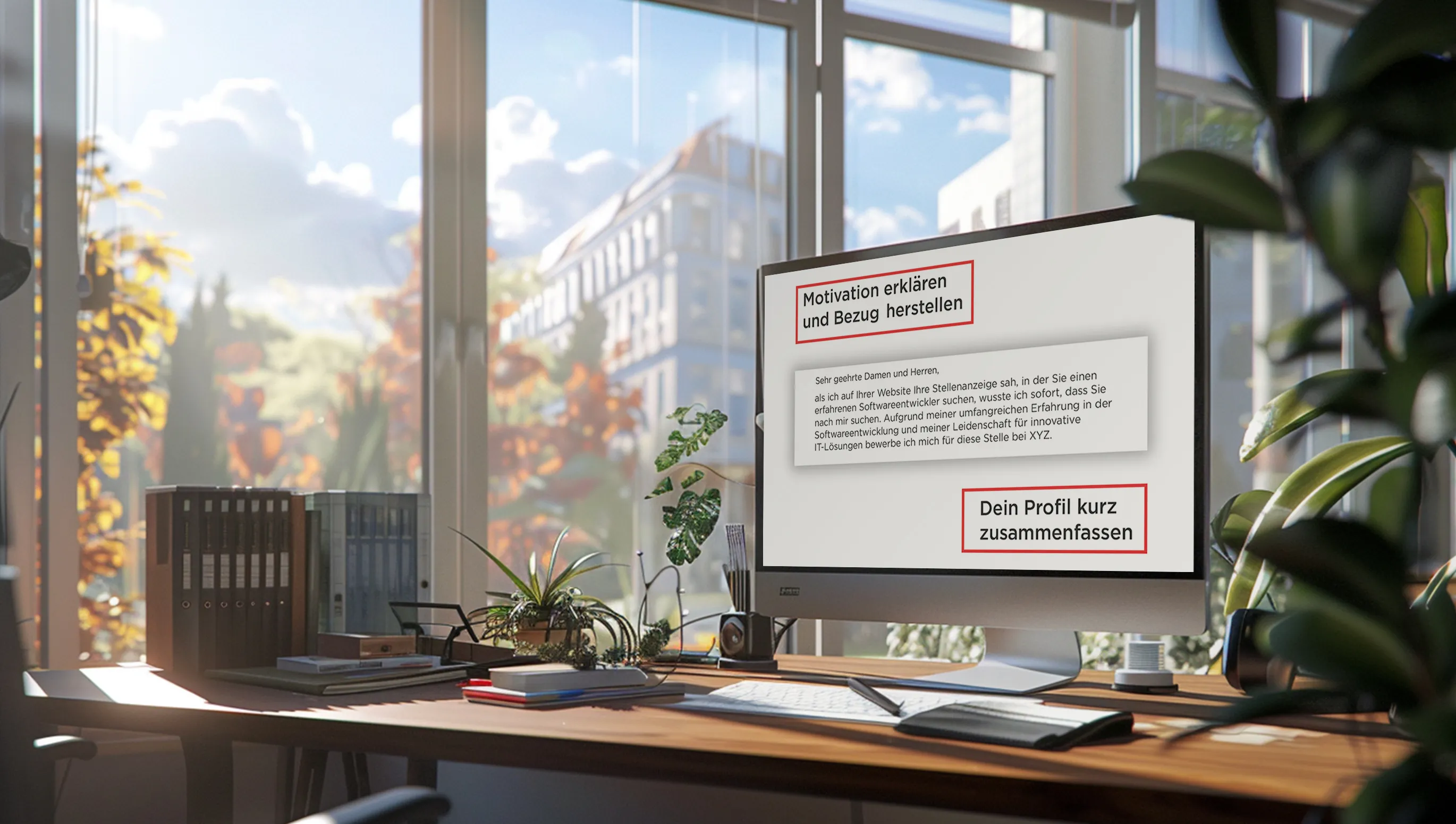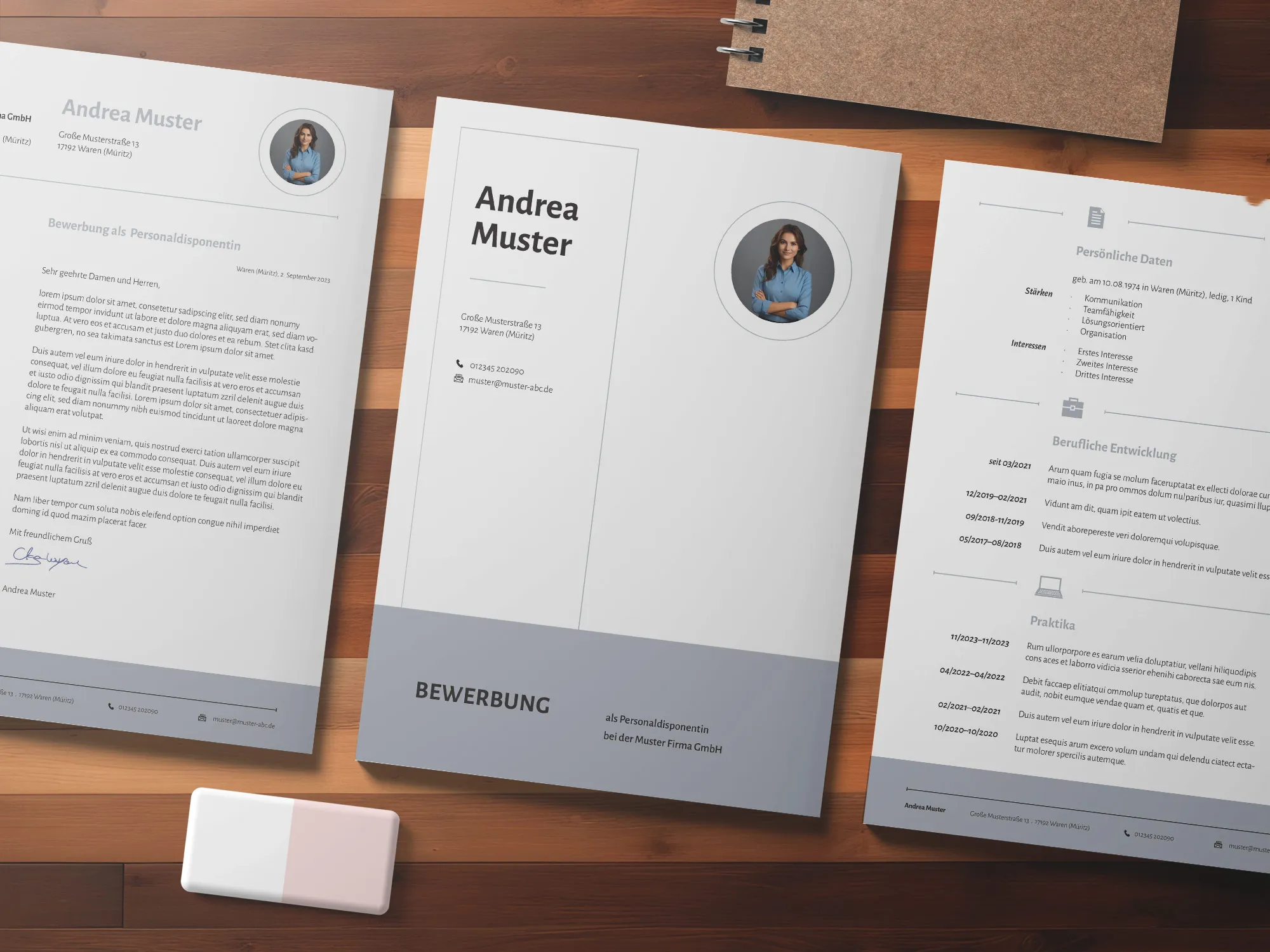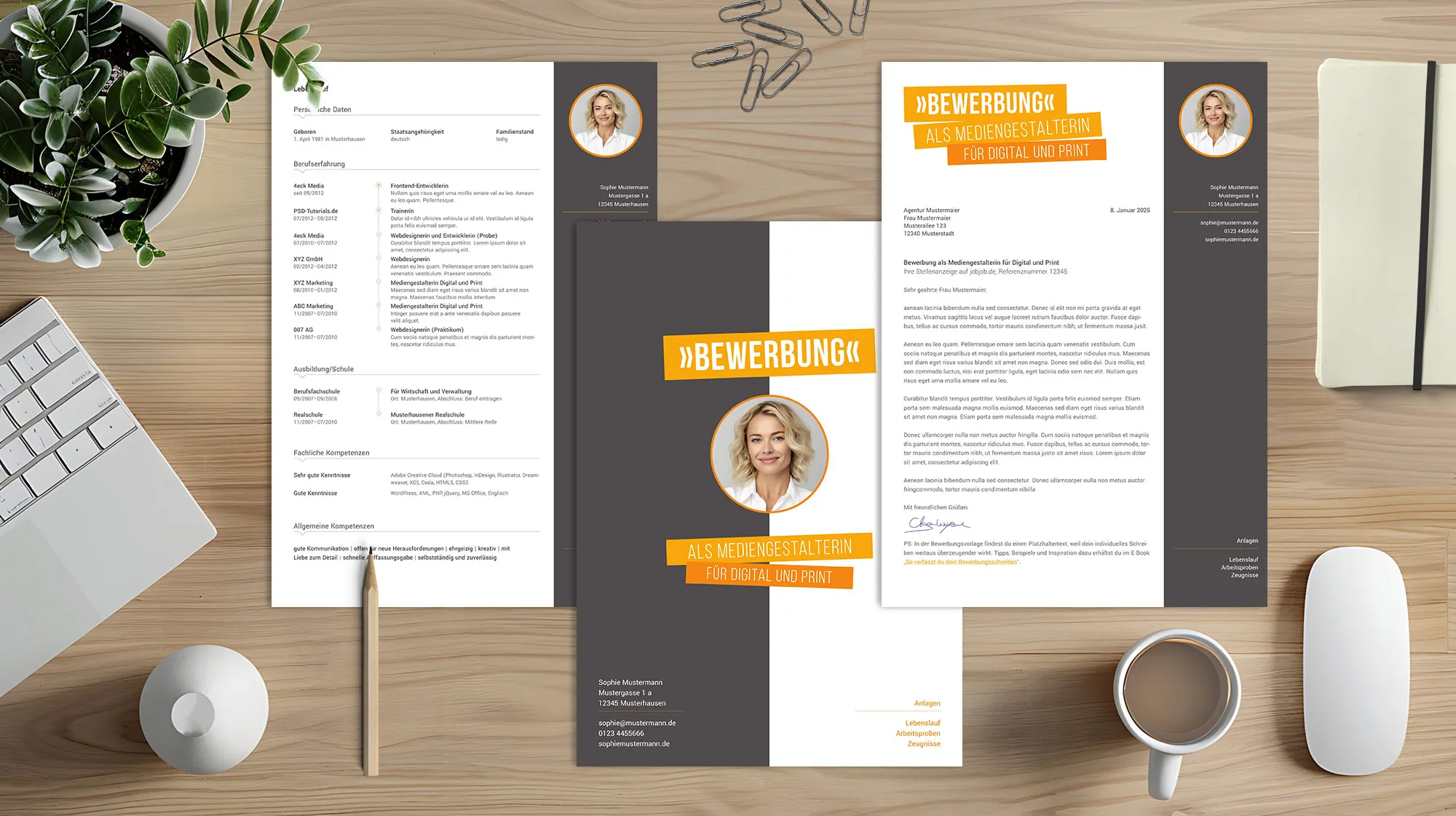Designing a cover letter: Examples, phrases & practical tips
The introduction of your cover letter is one of the first opportunities to make an initial impression on the potential employer. This short but important section should grab the recruiter's attention and motivate them to read your entire application thoroughly. Right from the start, the recruiter will recognize whether it is just another cover letter with the usual empty phrases or whether there is more content that deserves to be read more carefully. A successful introduction is clear, precise and tailored to the position you are applying for.
In this article, I'll show you how to write a compelling introduction that immediately makes a positive impression and increases your chances of getting an interview and ultimately the job.

Why the introduction is so important
A compelling introduction in your cover letter is the first means of impressing the employer and grabbing their attention. This short but significant section should make a positive impression, generate interest, show your motivation, highlight the relevance of your application and set the tone for the rest of the letter. Given that recruiters only spend an average of 10 to 30 seconds on each application across a large number of applications, there are good reasons why your introduction should be perfect:
- The first impression: the first few sentences set the tone for your entire cover letter. A clear, interesting and well-structured introduction ensures that the recruiter gains a positive impression of you. A positive first impression can have a significant impact on how your application and your job interest are perceived overall.
- Attract attention: Many companies often receive numerous applications for a single position. The employer usually does not have much time to read each letter in full. A strong introduction immediately attracts attention and makes the reader curious to find out more about you.
- Demonstrate motivation: Your cover letter is also a great opportunity to show why you are interested in the particular job and company. It emphasizes your motivation and the seriousness of your intentions, which are important criteria for employers when selecting applicants.
- Emphasize relevance: By tailoring your cover letter to the requirements of the job, you can directly highlight the key qualifications or experience that make you the ideal candidate. This way, the employer will immediately understand why they should consider you.
- Set the context: A well-written introduction sets the scene for the rest of your letter. It allows you to present your experience, skills and achievements logically and consistently in the following paragraphs.
A successful introduction is therefore not a mere formality, but a strategic element of your cover letter that can influence the rest of the impact of your entire application. Therefore, pay enough attention to the introduction so that it is clear, concise and convincing.
Introduction to the cover letter
To help you understand what we are talking about, here is the structure of the cover letter.
- Sender and date: At the top left, write your name, address, telephone number and e-mail address. Below this, enter the date on which you are writing the cover letter.
- Recipient: This is followed by the contact details of the company you are applying to. This includes the name of the company, the name of the contact person (if known), the address and, if applicable, the department.
- Subject: A short and concise line stating which position you are applying for, e.g. "Application for Marketing Manager".
- Salutation: A polite greeting to the contact person, e.g. "Dear Ms. Müller," or "Dear Mr. Schmidt,". If the name is not known, you can use "Dear Sir or Madam".
- Introduction: A short paragraph that arouses the reader's interest and makes your motivation for the application and the reference to the advertised position clear.
- Main section: This is where you describe your relevant experience, skills and qualifications in detail. Show why you are the ideal candidate for the position and how your skills can benefit the company.
- Conclusion: A final paragraph in which you summarize your application and emphasize your interest in an interview. Thank them for considering your application.
- Greeting and signature: A polite closing formula, e.g. "Yours sincerely," followed by your handwritten signature (for a printed application) and your typed name below it.
The most common mistakes in the introduction to the cover letter
Although the introduction is relatively straightforward in length, many applicants make mistakes when writing it that reduce their chances of being invited for an interview. Sometimes even small mistakes can have a negative impact on how your application is perceived. You should therefore be as attentive and focused as possible when working on this section. Try to avoid the following mistakes:
Vagueness and general wording
Do not use general phrases such as "I am writing to apply for a job." This does not give a clear idea of your motivation and interest in the specific position. Start with specific information about the position you are applying for and why you are interested in this particular company.
- Negative example: "I am writing to apply for a position in your company."
- Positive example: "It is with great enthusiasm that I apply for the position of Marketing Manager at [company name], as I am fascinated by your innovative product range and your market-leading position."
Lack of personalization
Avoid standard formulations that do not mention a specific company or position. This gives the impression that you are sending the same application to many companies. Personalize your introduction by mentioning the name of the company and the position and explaining why you want to work there.
- Negative example: "I am hereby applying for a position in your company."
- Positive example: "I am particularly excited about the opportunity to work as a software developer at [company name] because I am very interested in your projects in the field of artificial intelligence."
Introduction too long
An overly long and confusing introduction that overwhelms the reader with unnecessary information will put employers off. If they see this, they will probably put your application aside immediately. Be concise and specific. Limit the introduction to a few sentences that clearly convey the most important information.
- Negative example: "I am writing to you because I am looking for a new professional challenge and your company seemed like the right one for me because I think that the skills and experience I have gained in various areas could be a good match for the requirements of the position you have advertised."
- Positive example: "With my five years of experience in project management and my passion for technological innovation, I am applying for the position of Project Manager at [company name]."

Lack of key qualifications
Failure to mention the key skills and experience that make you a suitable candidate is a missed opportunity. Make sure you mention important qualifications or relevant experience that fit the job.
- Negative example: "I have worked in various positions in the past that have prepared me well for this job."
- Positive example: "Thanks to my many years of experience in data analysis and my expertise in Python and SQL, I am ideally suited for the advertised position of data analyst at [company name]."
Inadequate presentation of motivation
An unclear or missing motivation in the introduction means that the employer will not understand why you want the job. Make it clear why you are interested in the job and how your values match those of the company.
- Negative example: "I want this job because it matches my skills."
- Positive example: "The sustainable initiatives of [company name] inspire me and fit perfectly with my beliefs and my previous work in environmental management."
Grammatical and spelling errors
Errors in grammar and spelling show carelessness and inattention. Check your application carefully before sending it, use spell check programs or ask someone to check it.
- Negative example: "I' am a god candidate, because I have expereince in that field."
- Positive example: "I am a good candidate because I have extensive experience in this field."
Long and complicated sentences
Many applicants try to pack as much information as possible into one sentence, which can be confusing and cause the reader to lose the thread. Keep your sentences short and concise and keep them simple.
- Negative example: "During my professional career to date, which spans more than a decade and in which I have worked in various roles in different industries, I have gained many different skills and experiences that I believe make me a suitable candidate for this position."
- Positive example: "I have over ten years of professional experience in various industries and am confident that my skills are a good fit for the advertised position."
Use of clichés
You need to use an introduction to capture the interest of decision makers who have to read many applications every day and make quick decisions. Classic introductions such as "I hereby apply" or "I have read your job advertisement with great interest" are rather unsuitable for this. Many recruiters have read these sentences many times before.
- Negative example: "I am hereby applying for the position of..."
- Positive example: "It is with great enthusiasm that I am applying for the position of Product Manager at [company name], as I admire your innovative approach and your claim to market leadership."
Poor greeting
A lack of formality, correct salutation and personalization gives the employer the impression of indifference. Therefore, you should always write "Dear Sir or Madam" and include an academic degree or other title if appropriate.
- Negative example: "Hello everyone,"
- Positive example: "Dear Dr. Müller,"
!!! Avoid subjunctives !!!
The use of subjunctives such as "would", "could" or "would have" can convey uncertainty and a lack of self-confidence. Subjunctives make your text appear uncertain and less convincing. Instead, use the indicative form to sound determined and confident.
- Negative example: "I would be delighted if I had the opportunity to work in your company."
- Positive example: "I look forward to working in your company."

Examples for the introduction of the application letter
Example 1:
"The position of Marketing Manager in your company immediately appealed to me. Your innovative approach to marketing and your impressive projects are a perfect match for my five years of experience in digital marketing and my creative ideas. I am convinced that I can complement your team perfectly."
Example 2:
"As a longtime admirer of your sustainable business philosophy, I am excited to apply for the position of Project Manager at your company. My extensive experience in project planning and implementation fits perfectly with the requirements of this position and I am highly motivated to drive your exciting projects forward."
Example 3:
"My previous jobs in customer service have taught me the importance of excellent communication skills and customer focus. The position as a Customer Service Representative at your renowned company offers the ideal opportunity to further develop my skills and actively contribute to the satisfaction of your customers."

Clichéd formulations
Important!!! Also avoid the clichéd phrase "with great interest".
Clichéd phrases such as "With great interest I have..." come across as impersonal and generic. They give the impression that you are sending the same application to many companies without really looking into the specific position or company. Recruiters read many applications and recognize such phrases immediately, which can lead to your application being perceived as unoriginal and poorly thought out.
Examples of clichéd phrases and their alternatives
Bad: "I have read your job advertisement with great interest and would like to apply."
Better: "The position of marketing manager in your company immediately appealed to me. Your innovative approach to marketing fits perfectly with my five years of experience in digital marketing."
Bad: "I am hereby applying for the advertised position as..."
Better: "As a long-time admirer of your sustainable business philosophy, I am pleased to apply for the position of Project Manager in your company. My extensive experience in project planning and implementation fits perfectly with the requirements of this position."
Bad: "I am convinced that my qualifications meet your requirements."
Better: "My previous work in customer service has taught me the importance of excellent communication skills and customer focus. The position as a customer service representative at your renowned company offers the ideal opportunity to develop my skills and actively contribute to the satisfaction of your customers."
Five clichéd phrases in the application letter
- "I have read your job advertisement with great interest."
- "I hereby apply for the advertised position as..."
- "I am convinced that my qualifications meet your requirements."
- "I am highly motivated and a team player."
- "I see my strengths in my flexibility and my ability to grasp things quickly."
Further tips for writing a cover letter
Remember that the introduction is a key element of a cover letter that should catch the employer's interest and make them want to read on. Here are other recommendations that will help you make it more efficient and effective:
- Use short and clear sentences: This helps to keep the text uncluttered and easy to read, which is important when an employer is going through many applications.
- Tailor your introduction to the company and the job: Show that you know the company and its values. For example, mention what appeals to you about the company's working methods or products.
- Link your qualifications to the company's requirements: Emphasize how your experience and skills match the requirements of the position. This shows the employer that you are exactly the applicant they are looking for.
- Be specific: Avoid generalities. Instead, mention specific projects or achievements that show your relevance to the job.
- Focus on the future: Show how you can contribute to the company's future projects. For example, describe how you want to use your skills to develop new areas or improve existing processes.
- Use an active voice: It makes the text more dynamic and convincing. For example, instead of "It is expected that", use "I contribute".
- Show your uniqueness: Emphasize your unique qualities or experiences that set you apart from other applicants. This could be special training, voluntary work or special projects.
- Check the text for errors: Always check your text carefully for grammatical and spelling errors. Clean and correct language shows your attention to detail and your professionalism.
A strong and well-structured introduction to the cover letter is one of the key elements for a successful application. A good introduction grabs the employer's attention, highlights your motivation and qualifications and creates a positive first impression. Following the guidelines for a confident tone, clarity and personalization will make your cover letter effective and professional.
If you want to save time and make sure your cover letter is perfectly formatted, you can use TutKit.com's ready-made cover letter templates. With these templates, you can quickly and easily create a professional cover letter that meets all requirements and standards. Download ready-made cover letter templates from TutKit.com and take the first step towards a successful career today!
From Vitalii Shynakov
